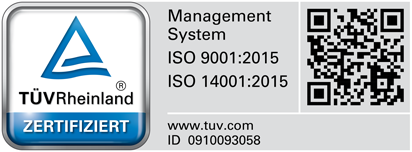sales@lufapak.de +49 2631/384-0 Contactform
Forwarding order
Organizing the transport of goods requires precise planning and sound specialist knowledge. The forwarding order is the central document for the entire transportation process. Logistics companies require precise information in order to transport your goods safely and on time. This guide provides basic knowledge on the correct creation of orders and covers important aspects of transport organization.
What is a forwarding order?
A forwarding order regulates the transportation of goods between the consignor and consignee by a logistics service provider in a binding manner. This legally binding document contains all relevant information about the transportation. The client uses it to commission a freight forwarder to organize the transport. It is particularly important that all information is complete and correct, as incorrect or incomplete forwarding orders can lead to delays and additional costs. Carriers require detailed information on collection, delivery and the nature of the goods in order to ensure smooth processing. For international shipments in particular, additional documents such as customs papers must be taken into account.
The most important components of a forwarding order
Sender and recipient data
The correct recording of contact details forms the basis of every forwarding order. In addition to the complete addresses of the sender and recipient, contact persons with telephone numbers and e-mail addresses must be specified. Exact details of departments or parts of buildings are particularly important for company addresses. Additional information such as opening hours or access restrictions make delivery easier. For regular shipments, it is advisable to create address master data to simplify order creation. The availability of contact persons must be guaranteed during the entire transportation process.
Description of goods and quantities
Precise information on the type and scope of the shipment enables optimal transportation planning. In addition to the name, the goods description also includes specific properties such as dangerous goods classes or temperature-sensitive goods. Dimensions and weights must be listed individually for each transport unit. The total number of packages is used to check completeness on acceptance and delivery. Standardized dimensions must be specified for pallet shipments. Special features such as stacking prohibitions or special handling instructions require separate notes. This detailed information forms the basis for safe transportation.
Packaging and shipping method
The choice of suitable packaging protects your goods during transportation. Standardized packaging units such as Euro pallets or pallet cages simplify handling. The freight forwarder requires information on the type of packaging for vehicle selection and load securing. The shipping method determines the transportation time and costs. Express delivery or scheduled shipments require special marking in the forwarding order. Additional packaging regulations may apply for sensitive goods. Proper packaging is always the responsibility of the shipper.

Types of forwarding orders
National forwarding orders
National forwarding orders are limited to transportation within national borders. This form of transportation is subject to German transport regulations and national freight law. Standardized processes usually enable short transit times. Processing is carried out in accordance with the uniform specifications of the German Freight Forwarders’ Standard Terms and Conditions. Regional particularities such as transit restrictions or environmental zones must be taken into account. Many freight forwarders offer fixed route plans with regular departures for domestic transportation. Electronic order entry speeds up processing.
International forwarding orders
Cross-border transports require additional documents and permits. International forwarding orders must take into account the respective import regulations of the destination countries. Customs documents and proof of origin must be prepared in good time. Transportation is subject to international agreements such as the CMR Convention. Longer transit times due to border controls or customs clearance must be planned for. Language barriers can be overcome with multilingual freight documents. Cooperation with experienced partner companies abroad ensures smooth deliveries.
Freight forwarding order costs: what you can expect
Basic prices and surcharges
The freight forwarding order costs are made up of various components. Basic prices are based on the distance, weight and volume of the shipment. Additional services such as express delivery or scheduled delivery incur surcharges. Tolls and fuel surcharges are calculated separately. Special services such as notification or the provision of a lifting platform increase the total costs. Discounts are possible for regular shipments or larger shipment volumes. Transparent price models enable precise calculation of transportation costs. Seasonal fluctuations can influence freight rates.
Factors influencing costs
Various factors influence the level of transportation costs. In addition to the pure route length, delivery times and desired additional services play an important role. Delivery addresses that are difficult to access can cause additional costs. Vehicle capacity utilization and seasonal fluctuations have an impact on pricing. Special requirements such as the transportation of hazardous goods or refrigerated transport lead to higher costs. Regular market comparisons help to optimize transport costs. Early planning often enables more favorable conditions.
Digital processing of forwarding orders
Online booking systems
Modern booking platforms simplify the recording of forwarding orders. Digital forms systematically guide you through the entry process and check the completeness of the information. Interfaces to merchandise management systems enable automatic data transfer. Electronic order tracking provides insight into the processing status at all times. Archiving is audit-proof in digital form. Pre-prepared order templates speed up recurring bookings. Electronic signatures are increasingly replacing paper-based processes.
Tracking and status tracking
Digital tracking systems enable the seamless tracking of forwarding orders. GPS-supported tracking provides real-time information on the position of the shipment. Automatic notifications provide information about important events during transportation. Electronic proof of delivery documents the successful handover. Deviations from the planned transport route are detected immediately. Integration into existing logistics systems optimizes process control. Mobile applications enable access to status information while on the move.
Legal aspects of forwarding orders
Liability and insurance
Liability for transport damage is governed by statutory provisions. Freight forwarding insurance offers additional protection over and above the statutory limits. Claims are settled in accordance with established procedures, taking into account the documentation. Exclusions of liability must be clearly marked in the forwarding order. Special agreements on value protection must be set out in writing. Regular review of insurance cover ensures sufficient coverage. Compliance with safety regulations minimizes potential damage risks.
Documentation obligations
Legal requirements regulate the storage of forwarding documents. Bills of lading and proof of delivery must be archived for at least six years. Electronic archiving systems facilitate audit-proof storage. Complete documentation ensures evidence in the event of complaints or legal disputes. Data protection regulations must be observed when archiving. Regular updating of documentation processes ensures legal compliance. Standardized filing systems facilitate the retrieval of documents.
Tips for the successful processing of forwarding orders
Checklist for your forwarding order
Systematic checks prevent errors when creating orders. Complete address and contact details form the basis. Precise goods descriptions avoid misunderstandings when planning transportation. Deadlines must be realistic and clearly formulated. Special requirements for vehicles or equipment must be emphasized. Necessary accompanying documents must be prepared in good time. Regular coordination with the freight forwarder optimizes cooperation. The consistent use of checklists reduces sources of error.
Common mistakes and how to avoid them
Incomplete or incorrect information leads to delays in the transportation process. Misleading deadlines cause problems with scheduling. Inaccurate dimensions and weights make vehicle planning more difficult. Missing information on special features can lead to problems during delivery. Lack of communication between the parties involved delays problem solving. Careful checking of all details before placing an order prevents complications. Regular training improves the quality of order preparation. Standardized processes minimize the risk of errors.
Conclusion and outlook
The professional handling of forwarding orders requires careful planning and precise execution. Digital solutions are increasingly optimizing processes in transport logistics. Rising sustainability requirements are influencing the development of new transportation concepts. Automation and artificial intelligence will further simplify order processing. Legal framework conditions are adapting to changing market conditions. Flexibility and adaptability ensure competitiveness in the freight forwarding business. The continuous optimization of processes remains a central task.
Contact us now and get advice

